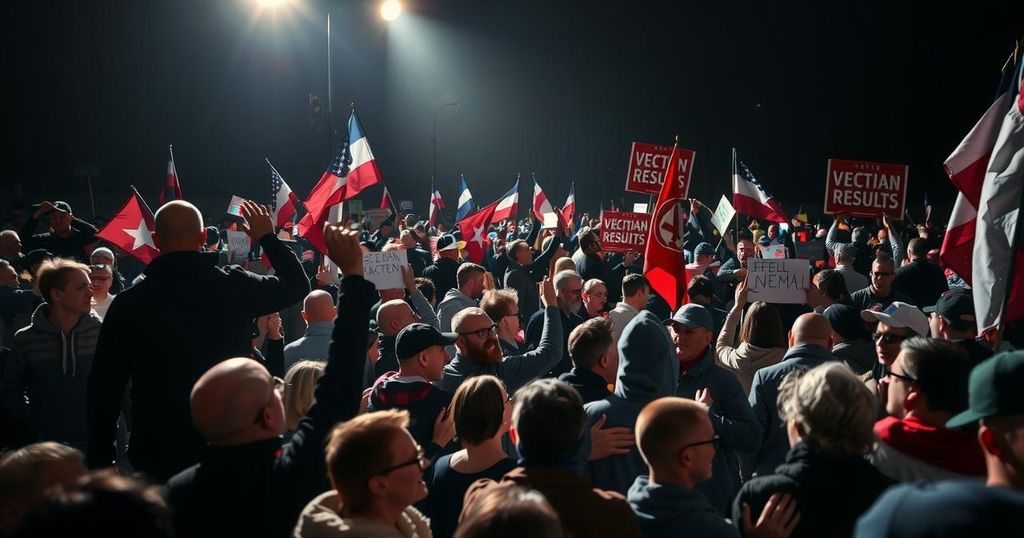Mass Protests Erupt in Georgia Over Controversial Parliamentary Elections

Tens of thousands of Georgians protested in Tbilisi against the ruling Georgian Dream party’s election victory, alleging the results were manipulated with Russian assistance. The U.S. and European allies condemned the election irregularities, prompting calls for investigations. President Salome Zourabichvili expressed solidarity with the protesters, whereas the ruling party rejected claims of election fraud. Opposition leaders have pledged to boycott parliament and demand a new vote, forecasting significant political unrest in Georgia amidst concerns over its democratic integrity.
On Monday, a significant number of Georgians took to the streets in Tbilisi to protest against the results of the recent parliamentary elections. The Georgian Dream party, which currently holds power, has been accused of orchestrating a rigged election process with alleged assistance from Russia. The official election results revealed that the ruling party secured approximately 54% of the votes, while four pro-Western opposition alliances accumulated about 38%. These events have drawn criticism from the United States and other Western allies, who noted irregularities in the electoral process. In defiance of the electoral outcome, protesters, many of whom carried Georgian and European Union flags, gathered outside the parliament building. Pro-Western President Salome Zourabichvili addressed the crowd, stating, “Your votes were stolen, but we will not let anyone steal our future.” She asserted that the recent elections had been manipulated through sophisticated means purportedly linked to Moscow. The United States, the European Union, and other nations condemned the conduct of the elections and called for a thorough investigation into the reported irregularities. Georgian authorities, however, rejected claims of vote rigging. Kremlin spokesman Dmitry Peskov firmly denied any Russian meddling in Georgian elections, characterizing Zourabichvili’s call for protests as a strategy to instigate instability within the country. Parliament speaker Shalva Papuashvili accused the president of attempting to create a coup scenario that jeopardizes constitutional order. Opposition leader Giorgi Vashadze announced that the opposition parties would refuse to enter the parliament and demanded a new vote with international oversight. He stated, “We refuse all mandates. We are going to fight until victory, and we promise you, we will definitely win together.” EU Commission President Ursula von der Leyen echoed sentiments of autonomy for the people of Georgia, asserting that they must determine their own destiny. Additionally, U.S. Secretary of State Antony Blinken highlighted the need for Georgian leaders to uphold the rule of law and address flaws in the electoral process while aiming to strengthen ties to the Euro-Atlantic community. In stark contrast, Prime Minister Irakli Kobakhidze lauded the ruling party’s victory as obvious and urged dismissals of allegations concerning election manipulation. The Georgian Dream party, which has been in power for four terms, will occupy 89 seats in parliament, one less than in the previous election. As the situation unfolds, three of the main opposition parties have voiced their refusal to participate in parliamentary sessions, thereby not legitimizing what they view as a fraudulent election. The developments signal a considerable challenge to democracy in Georgia, with Western nations expressing concerns over the nation’s increasing alignment with Russian influence. As the protests unfold and opposition leaders stand firm against the election results, the political landscape in Georgia remains tumultuous, with calls for transparency and fairness in governance resonating throughout the country.
In recent years, Georgia has witnessed a significant rise in political tensions, primarily between the ruling party, Georgian Dream, and several pro-Western opposition alliances. The ruling party has faced allegations of authoritarian tendencies and a shift towards policies that resemble those of the Kremlin. Discontent surrounding the electoral process underscores a larger struggle for Georgia’s political identity amid attempts to align more closely with the European Union in the face of Russian influence. The protests reflect deep-seated concerns among the populace regarding the integrity of democratic processes in their nation.
The protests in Georgia highlight widespread dissatisfaction with the recent parliamentary elections, which have been characterized by accusations of manipulation and external interference. The response from both opposition leaders and Western nations reveals a profound concern for the direction of Georgian democracy. As calls for thorough investigations and accountability grow louder, the political future of the country hinges on restoring trust in its electoral institutions and affirming Georgia’s commitment to its European aspirations.
Original Source: www.voanews.com








